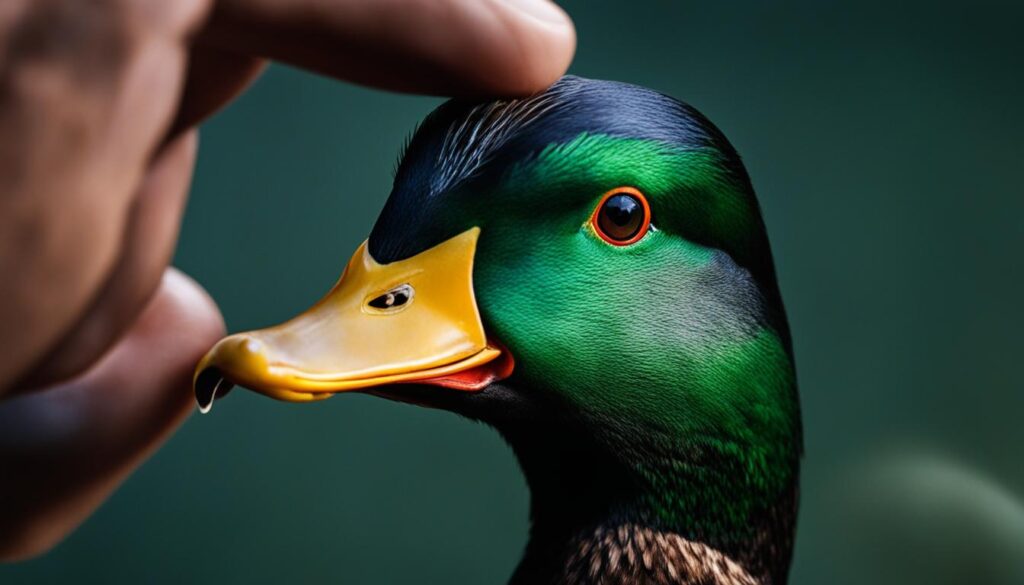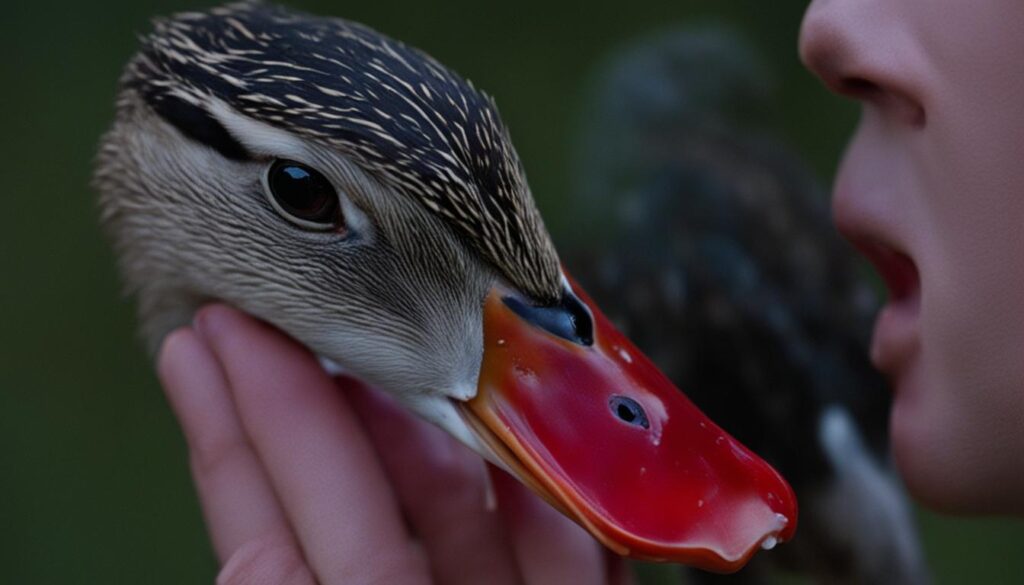As a hobby farmer, I’ve spent countless hours designing my backyard duck setup, caring for these feathered friends, and observing their behaviors. Over time, I’ve developed a unique bond with my ducks through daily duck interactions, feeding, and watching them waddle around. However, the question “can ducks hurt you?” often surfaces among new hobby farmers and duck enthusiasts. It’s a valid concern that merits an in-depth look to ensure the safety of those raising ducks and those curious about engaging with them.
While ducks are generally perceived as docile and friendly birds, it is essential to consider that all animals can have unexpected responses to human interaction. Through this exploration, we’ll dive into the truth behind duck behavior and the potential for these birds to cause harm, ensuring that you, too, can enjoy the pleasures of a backyard duck setup without unnecessary worry.
Key Takeaways
- Understanding the potential for ducks to cause harm is crucial for hobby farmers.
- Ducks typically exhibit gentle behaviors, but like all animals, they have their limits.
- Recognizing signs of aggression can help prevent negative duck interactions.
- A well-planned backyard duck setup can influence duck behavior positively.
- Knowledge of duck habits and dispositions is key to a harmonious farm life.
- Educating oneself about ducks is the first step towards safer engagements.
Understanding Duck Behavior and Aggression
As a hobby farmer, it’s essential to recognize the various facets of your backyard flock’s behavior. Ducks, often perceived as peaceful waterfowl, can exhibit a range of temperaments – some of which may surprise you. In this section, we’ll delve into the question that many duck owners ponder: can ducks bite humans? We’ll examine instances that may provoke a duck and how to identify duck aggression signs effectively. Additionally, the topic of duck mating behavior will be addressed, shedding light on seasonal changes that could affect the demeanor of your ducks.
The Nature of Ducks: Are They Aggressive?
Ducks are generally social creatures, often displaying a calm demeanor. However, like any animal, they can become aggressive under specific circumstances. The triggers for such behavior may include a perceived threat to their territory or offspring, competition for food, or even stress caused by environmental factors. Understanding these triggers is crucial for maintaining a serene environment for both the ducks and their caretakers.
Recognizing Aggressive Duck Body Language
Observing your ducks’ body language can provide clear indicators of their mood. An aggressive duck may lower its head and charge, hiss, peck, or even flap its wings to assert dominance or fend off unwanted company. It’s vital to heed these duck aggression signs and react appropriately to prevent any possible harm. Fostering a safe distance during these displays and avoiding sudden movements can mitigate the risk of a confrontation.
Seasonal Aggression: Mating and Brooding Periods
Seasonal changes can have a profound impact on a duck’s behavior, particularly during mating season. The surge in hormones can lead to more aggressive and competitive interactions, often leading to the question, ‘can ducks bite humans’? Yes, during this time, even the most placid individuals can show a formidable change, defending mates or nest sites. Understanding duck mating behavior is essential for hobby farmers in anticipating and managing these seasonal dynamics.
- Watch for changes in posture that signal agitation or territorial aggression.
- Keep a close eye on male ducks during the breeding season, as they can be especially assertive.
- Be aware of brooding females who may fiercely protect their nest and offspring.
Whether you’re a novice or a seasoned hobby farmer, understanding the nuances of duck behavior is fundamental. By becoming familiar with the signs and seasonal patterns of aggression, we are better equipped to create a harmonious living space for our feathered friends and ourselves. Remember, patience and vigilance are key in cultivating a trusting relationship with your backyard ducks.
Can Ducks Bite Humans and the Potential Risks
As a seasoned hobby farmer, I’ve learned to never underestimate the behavior of ducks. One question that often crops up among new duck owners is, can ducks bite u? From personal observation and a bit of research, I’ve found that while a duck’s bill may seem harmless compared to the teeth of a dog or cat, ducks can indeed use their bills to nip and pinch. This brings us to a common concern: does a duck bite hurt? Although ducks lack the sharp teeth of other animals, their bites can still cause discomfort or bruising, particularly to young children or those with sensitive skin.
Interestingly, the question of can ducks bite hard is nuanced. Ducks do not have the jaw strength of many predators, but that doesn’t mean they are incapable of exerting pressure. They are more likely to grab and twist the skin rather than inflict a puncture wound. Nevertheless, it’s important to understand the context behind a duck’s bite. Ducks may nip during feeding if they mistake a finger for food, or they might bite out of fear or to establish dominance within their flock.
While a duck bite is not as forceful as that of many other animals, it is the surprise and persistence of a duck’s nibble that can catch you off guard.
I remember one day, during a routine egg collection, a particularly territorial female duck decided that my approach was too close for comfort. She proceeded to demonstrate just how assertive she could be with her bill. Although it was startling and a tad painful, I can attest that the bite did not break the skin, but the experience left me with a newfound respect for her space during laying season.
- Visibility of Duck’s Temperament
- Intensity of a Duck’s Bite
- Reasons Behind Biting Behavior
To ensure you’re prepared to handle ducks safely, keep the following in mind:
- Always approach ducks calmly to avoid triggering a defensive reaction.
- Observe the body language of your ducks; flapping wings or hissing could indicate they feel threatened.
- During the mating season, give ducks more space to prevent any hormone-driven nipping.

In conclusion, while the occasional nip from a duck is unlikely to do serious harm, it does serve as a reminder that all animals, regardless of size or perceived gentleness, have boundaries that must be observed. As with all aspects of hobby farming, understanding and respecting the animals in your care is paramount for a peaceful and injury-free coexistence.
Personal Accounts: When Ducks Have Bitten Me
As a seasoned hobby farmer, I’ve had my fair share of up-close encounters with ducks. While they’re often seen as peaceful animals, the question remains amongst duck enthusiasts: what happens if a duck bites you? To those wondering, can ducks break skin, the answer is not straightforward but worth understanding through real-life contexts. In my experiences, the nature of a duck bite can vary greatly. Below, I’ll share some of my most memorable duck bite experiences.

- In one instance, a particularly territorial male duck nipped at my hand. It resulted in minor redness but no broken skin.
- A mother duck, while defending her ducklings, managed to pinch my ankle firmly enough to leave a small bruise.
- During feeding time, an overzealous duck mistook my finger for food and its bill pinched with surprising strength, although it didn’t break the skin.
The aftermath of these bites typically involved cleaning the affected area and monitoring for any signs of infection. Fortunately, duck bites are rarely serious. However, it’s crucial to treat even the smallest wound with care to prevent any complications.
| Incident | Pain Level | Visible Mark | Aftercare |
|---|---|---|---|
| Hand Nip | Low | Redness | Disinfect |
| Ankle Pinch | Medium | Bruise | Clean & Ice |
| Finger Mistaken for Food | Medium | None | Disinfect & Bandage |
While ducks are not typically known to be aggressive, under certain conditions they will bite. It’s wise to approach them with caution and respect their space, especially during breeding season or when they are caring for their young.
Protective Measures to Prevent Duck Bites
As a steward of backyard poultry, I’ve found that preventive measures are the surest way to avert the unwelcome pinch of a duck’s beak. While it’s true that ducks can bite hard when feeling threatened or protective, understanding and guiding their behavior can greatly reduce the incidence of bites. From my hands-on experience, the key lies in early training and maintaining a respect-based relationship with your feathered friends. Implementing consistent training techniques helps establish clear boundaries, discouraging biting as a habitual response. Additionally, positive reinforcement can be a powerful tool in promoting desired behaviors in ducks.
Managing a duck bite, should one occur, begins with recognizing that the behavior is often rooted in stress or fear. It is crucial to address the underlying cause to prevent future incidents. Environmental modifications can also play a significant role in preventing duck bites. Creating a calm, spacious, and enriching habitat for ducks diminishes stress and aggression, making them less likely to resort to biting. Providing ample space, access to clean water, and hiding spots can help ducks feel secure and serene in their surroundings.
Finally, safety in handling ducks is imperative to prevent any misunderstanding that might lead to a bite. I approach my ducks with calm, deliberate movements and never from a position that might startle them. It is important to interact with ducks regularly, as this familiarizes them with human contact and helps mitigate their instinct to nip as a defensive mechanism. By implementing these strategies, hobby farmers can enjoy a harmonious relationship with their ducks, minimizing the chances of a bite while fostering an environment of mutual trust and respect.
